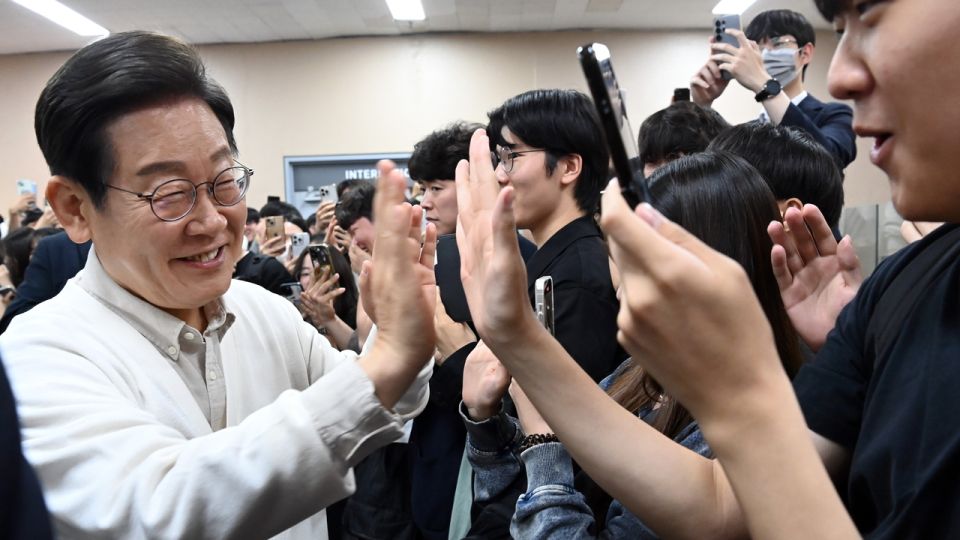May 27, 2025
SEOUL – Liberal presidential candidate Rep. Lee Jae-myung on Monday said that holding an inter-Korean summit would be “very difficult” under the current conditions, amid strained ties with North Korea.
“It’s not a matter of whether we are planning for (the inter-Korean summit) or not — it’s something we have to do,” Lee told reporters during a campaign stop in Suwon, Gyeonggi Province.
“But I’m not sure if the summit would come into being. It would be very difficult to proceed in the current circumstances.”
Lee, the flagbearer of the liberal Democratic Party of Korea, has pledged to rebuild inter-Korean relations, which deteriorated under former President Yoon Suk Yeol’s hard-line stance during his shortened term in office.
“There is no reason not to hold a summit with North Korea,” Lee said, adding that Seoul would be open to supporting and cooperating with US President Donald Trump if he proceeds with another summit with Kim.
Five inter-Korean bilateral summits have so far been held, with the last in September 2018 in Pyongyang between former liberal President Moon Jae-in and North Korean leader Kim Jong-un.
However, during Yoon’s tenure from May 2022 to April 2025, Seoul last year suspended the inter-Korean military agreement signed between former President Moon and North Korea’s Kim, while the two Koreas intermittently exchanged volleys of balloons carrying propaganda leaflets, or sometimes trash, with tensions intensifying.
Lee, who played a key role in lifting the martial law that Yoon imposed in December and later passing the impeachment motion that removed him from office, also underscored a need to institutionalize civilian control of the armed forces in South Korea in order for the military to regain public trust.
“Civilian control of the military is nothing new in advanced countries,” Lee told reporters. “We’ve had a tradition of naming a military officer as the defense minister, but now it seems a civilian could be nominated as the minister.”
Earlier Monday, Lee said that restoring communication lines between the two Koreas, halting activities that could escalate tensions along the border and encouraging “mutually beneficial” inter-Korean exchanges will be key to addressing the growing threats posed by North Korea’s nuclear program.
“I will push for mutually beneficial inter-Korean dialogue, exchanges and cooperation in a way that could win people’s support,” Lee said in his Facebook post Monday, adding that Seoul “can no longer tolerate” North Korea’s possession of nuclear weapons while progress for Pyongyang’s denuclearization remains stalled.
Rep. Wi Sung-lac, a Democratic Party lawmaker who advises on foreign affairs for Lee, said Monday in a briefing that if elected as the next president of South Korea, Lee was not considering easing sanctions against the North. Instead, Lee’s remarks were meant to focus on reviving what was enshrined in the 2018 inter-Korean pact.
The liberal presidential candidate also signaled thawing relations with China and Russia, apparently aimed at reversing the former Yoon administration’s stance that risked hostile relations with China and Russia for a stronger alliance with the United States and other neighbors like Japan.
“China is an important trade partner and holds sway over South Korea’s national security,” Lee noted in his Facebook post.
Lee also said diplomatic ties between South Korea and Russia would be improved while prioritizing South Korea’s national interests and simultaneously contributing to the reconstruction of Ukraine.
“The practicality in the diplomacy will be at play for South Korea’s national security and businesses,” Lee said.
Wi said South Korea’s relations with the two countries should be moderately managed, as relations with both had already “hit the bottom,” adding, however, that South Korea’s foreign affairs priority would lie in its relationships with the United States and Japan.
Meanwhile, conservative People Power Party candidate Kim Moon-soo has pledged to work toward bolstering the reliability of the US’ extended deterrence commitment to South Korea, in a policy goal announcement earlier this month. Extended deterrence refers to Washington’s commitment to using the full range of its military capabilities, including nuclear weapons, to defend an ally.
Unification with North Korea would be pursued to save North Koreans from hunger and oppression, according to Kim.
To counter North Korea’s advancing nuclear threats, nuclear-powered submarines would be developed to bolster South Korea’s maritime defense capabilities.
The People Power Party candidate also highlighted that the possible downsizing of the 28,500-strong United States Forces Korea would be “a dangerous” move for the allies, as it could “give room for Kim Jong-un to make wrong decisions,” in a Facebook post Sunday.
Kim Moon-soo’s Facebook post refers to a report released early Friday from The Wall Street Journal that claimed that the Donald Trump administration is weighing the option of pulling out some 4,500 troops, or around 15 percent of the USFK, and moving them to other locations in the Indo-Pacific region, including Guam, which is an American island territory.
The USFK later dismissed the report, saying that “the US remains firmly committed to the defense of the ROK and we look forward to working with the incoming government officials to maintain and strengthen our ironclad alliance.”
ROK is an abbreviation for the Republic of Korea, which is South Korea’s official name.


